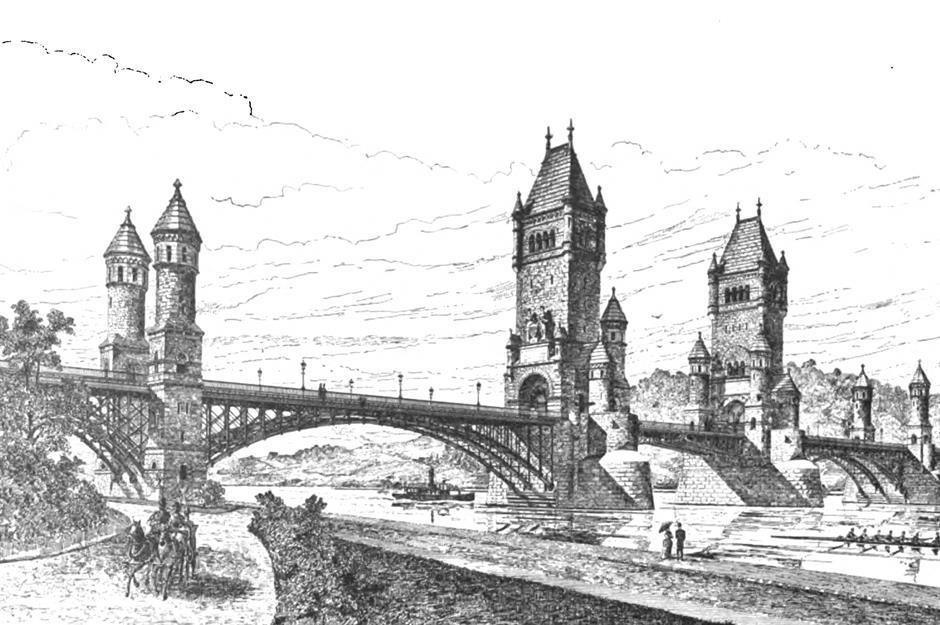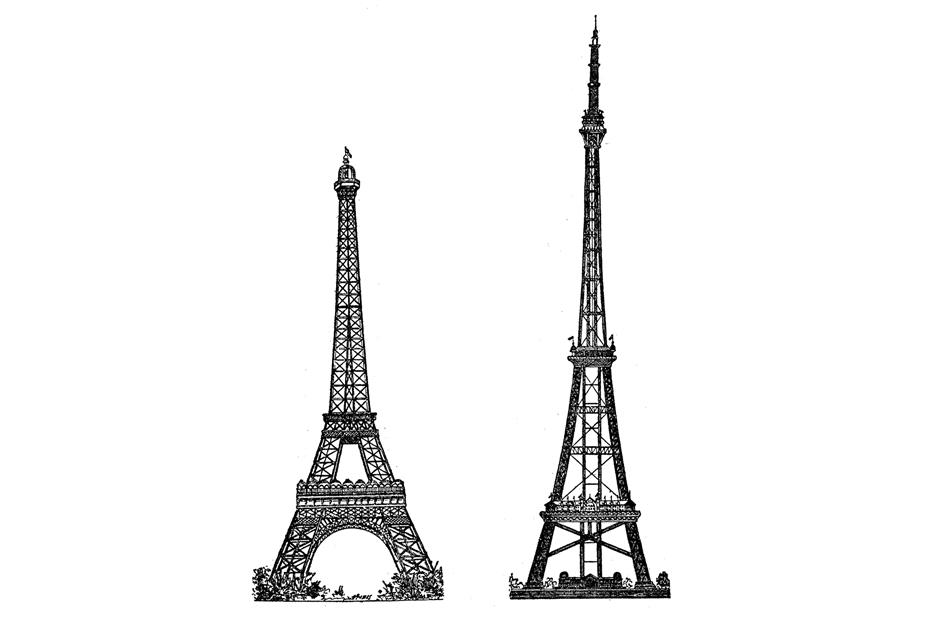Amazing tourist attractions that never got built
Plans that never came to be
Watkin's Tower, London, England
In the late 19th century, railway magnate Sir Edward William Watkin had a grand idea to get the paying public onto his trains. He decided to build the world's tallest structure – a 1,200 foot (366m) tower standing 150 feet (46m) taller than the Eiffel Tower, seen in the left of this sketch – in Wembley, then a London suburb connected to the city via Watkin's Metropolitan railway. The French architect Gustave Eiffel declined Watkin's offer to design a rival to his Parisian masterpiece, so in 1890, Watkins launched an architectural competition. Unsurprisingly, the winning design looked uncannily like La Tour Eiffel.
Watkin's Tower, London, England
The design included all manner of amenities, from a Turkish bath to a 90-room hotel. After thrilling themselves in the amusement park around the base of the tower, visitors would reach the top of the structure by an elevator. The surrounding park was a hit and the first layer of the tower was completed by 1896, but its popularity was not to last. Dwindling ticket sales and unstable foundations forced the part-built tower to close. By 1904 it had been dynamited into oblivion. Wembley Park remained popular, however; today it's the location of the 90,000-seat Wembley Stadium.
Hotel Attraction, New York City, USA
Antoni Gaudí's architectural masterpieces are famed the world over, from Barcelona's La Sagrada Família to colourful Park Güell – and one of his fantastical creations was almost realised in New York City. In the early 20th century, two businessmen (whose identities remain unknown) called on the Spanish architect to design a whimsical hotel in Manhattan. This rocket-shaped structure, dubbed Hotel Attraction, was what Gaudí dreamed up.
Hotel Attraction, New York City, USA
The futuristic hotel would have risen to between 980 and 1,100 feet (299 to 335m), with curving towers and an opulent interior containing multiple restaurants, exhibition space, a theatre and plush guest rooms. For reasons unknown, Gaudí's plans were never realised. However, the designs resurfaced in the early 2000s when they were submitted as a potential new design for the World Trade Center, after the tragic events of 9/11. Again, though, Gaudí's visions were passed over and all that remains are a handful of sketches.
Love this? Follow us on Facebook for more travel inspiration
Palace of the Soviets, Moscow, Russia
The imposing Palace of the Soviets, whose construction began in the late 1930s, was to serve as an administrative centre, and ultimately as a show of Soviet power. It was designed by architect Boris Iofan and planned for the site of the original Cathedral of Christ the Saviour, which had been razed to the ground in 1931 on the orders of Soviet leader Joseph Stalin. The ostentatious building, crowned with a looming statue of Stalin's predecessor Lenin, would have been one of the largest structures in the world at the time.
Palace of the Soviets, Moscow, Russia
Trafalgar Square Pyramid, London, UK
Nelson's Column (pictured) dominates London's Trafalgar Square and immortalises the lauded Admiral Horatio Nelson, who died at the Battle of Trafalgar in 1805 having defeated the French. It almost never existed, though. Politician and officer Sir Frederick William Trench wanted to commemorate the battle with something rather different: a gargantuan pyramid structure larger than St Paul's Cathedral. Luckily Trench's wishes were never fulfilled and the tribute to the late admiral was built instead.
The Illinois, Chicago, USA
The Illinois, Chicago, USA
Had it been built, The Illinois (pictured) would have been one mile (1,600m) high, with more than 500 storeys and room to house 100,000 people. Even today it would be the tallest building in the world, some 2,625 feet (800m) higher than Dubai's towering Burj Khalifa. Wright's plans never left the drawing board though, and the largest building in Chicago remains the diminutive 1,450-foot (442m) Willis Tower.
Wonderland Amusement Park, Beijing, China
A stone's throw from Beijing, you'll find the remnants of the Wonderland Amusement Park. It was once tipped to be China's answer to Disneyland but due to financial issues, construction on the ambitious theme park was halted in the late 1990s. It was never completed or opened, and all that remains is a fairy-tale castle, now the domain of urban explorers.
Port Disney, California, USA
Port Disney, California, USA
Walt Disney’s Riverfront Square, St Louis, USA
Mineral King, California, USA
Walt Disney's grand plans in the 1960s also included a ski resort in California. Before his death in 1966, Disney was intent on creating a winter sports paradise at the Mineral King valley in Sequoia National Park. The complex would have included a sprawling hotel, a cosy cinema, shops and ice rinks. However, questions were raised over the resort's profitability and it was widely condemned by conservationists too. Again, Disney's vision wasn't to be.
Guggenheim Helsinki, Helsinki, Finland
Guggenheim Helsinki, Helsinki, Finland
Clifton Suspension Bridge, Bristol, UK
Clifton Suspension Bridge, Bristol, UK
The idea for a bridge here first arose in the 1750s, when merchant William Vick left money towards the structure in his will. Architect William Bridges put forward a design (pictured) made up of a mighty stone arch, supported each side by towers of homes and factories. However, when the French Revolution kicked off, Bridges' plans were put on hold and eventually abandoned due to their steep costs. A competition was held to determine the final look of the bridge and Brunel's more pared-back design won.
Museum of Modern Art, Caracas, Venezuela
Coney Island Globe Tower, New York City, USA
Coney Island Globe Tower, New York City, USA
However, lengthy delays on the project ensued and as construction work failed to get off the ground, investors became suspicious. The stunted project was eventually written off as architectural fraud. Nevertheless, even without this imposing globe, Coney Island still has plenty of colourful attractions to pull in the crowds today.
Lunar Hilton Hotel, the Moon
Lincoln Memorial, Washington DC, USA
The Greek Revival-style Lincoln Memorial dominates Washington DC's National Mall, commemorating late president Abraham Lincoln. But the elegant final design of this monument faced some initial competition. Lauded architect John Russell Pope put forward several proposals for the landmark, including an Egyptian-esque pyramid fronted with porticos (pictured).
Lincoln Memorial, Washington DC, USA
Though Pope enjoyed later success with his plans for DC's Jefferson Memorial and the National Gallery, his designs for the Lincoln Memorial were rejected in favour of those by Henry Bacon (pictured). Now millions come to admire Bacon's creation each year and to view the imposing statue of President Lincoln seated within.
Battersea Power Station theme park, London, UK
The hulking Battersea Power Station watches over the River Thames and is looked upon fondly by many Londoners. It had ceased operations entirely by the 1980s and plenty of plans for its redevelopment have been floated over the years. The wackiest of all was a brash theme park envisioned by Alton Towers' John Broome in the late 1980s. Had the project gone ahead it would have included a mall, an ice rink and Vegas-style indoor roller coasters, all surrounded by manicured gardens. However, funding was halted and the family-friendly attraction was never to be.
General Ulysses S. Grant Memorial Bridge, Washington DC, USA
General Ulysses S. Grant Memorial Bridge, Washington DC, USA
However, funding for this bridge was blocked and, instead the simpler Arlington Memorial Bridge was completed at the site in 1932. A memorial to General Ulysses S. Grant (pictured) now stands at the foot of Washington DC's Capitol Hill.
Now discover the world's most incredible abandoned places you can actually visit

